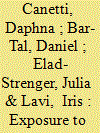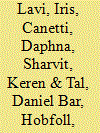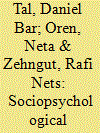|
|
|
Sort Order |
|
|
|
Items / Page
|
|
|
|
|
|
|
| Srl | Item |
| 1 |
ID:
150992


|
|
|
|
|
| Summary/Abstract |
Does ongoing exposure to political violence prompt subject groups to support or oppose compromise in situations of intractable conflict? If so, what is the mechanism underlying these processes? Political scholarship neither offers conclusive arguments nor sufficiently addresses individual-level forms of exposure to violence in the context of political conflict, particularly the factors mediating political outcomes. We address this by looking at the impact of exposure to political violence, psychological distress, perceived threat, and ethos of conflict on support for political compromise. A mediated model is hypothesized whereby exposure to political violence provokes support for the ethos of conflict and hinders support for compromise through perceived psychological distress and perceived national threat. We examined representative samples of two parties to the same conflict: Israelis (N = 781) and Palestinians from Gaza, East Jerusalem, and the West Bank (N = 1,196). The study’s main conclusion is that ethos of conflict serves as a mediating variable in the relationship between exposure to violence and attitudes toward peaceful settlement of the conflict.
|
|
|
|
|
|
|
|
|
|
|
|
|
|
|
|
| 2 |
ID:
086005


|
|
|
|
|
| Publication |
2009.
|
| Summary/Abstract |
This study investigates the psychological effects of a set of societal beliefs termed the ethos of conflict, which develops in the context of intractable conflict-as, for example, the Israeli-Arab conflict. The premise was that the ethos of conflict constitutes a type of ideology that serves as a powerful prism through which individuals perceive the reality of an intractable conflict. The study's findings confirmed this premise, showing that participants with a high level of ethos of conflict tended to perceive photos depicting encounters between Jews and Palestinians differently than did those with a low level of ethos of conflict. The former tended to perceive the Palestinians as more aggressive, to blame them more for such attributed aggressiveness, and to explain this perceived aggressiveness more in terms of internal and stable causes. They also tended to stereotype Palestinians more negatively and Jews more positively.
|
|
|
|
|
|
|
|
|
|
|
|
|
|
|
|
| 3 |
ID:
128964


|
|
|
|
|
| Publication |
2014.
|
| Summary/Abstract |
Can endorsement of the ethos of conflict alter psychological effects of exposure to political violence? Israelis and Palestinians have been in a state of political and military turmoil for decades. We interviewed 781 Israelis and 1,196 Palestinians living in the West Bank, Gaza Strip, and East Jerusalem. Using structural equation modeling, we found that among those with a weak adherence to ethos of conflict, exposure predicted higher levels of hatred. For Israelis with a weak adherence to ethos of conflict, exposure predicted higher psychological distress and fear. For Palestinians with weaker adherence to ethos of conflict, stronger exposure predicted stronger threat perceptions. Israelis and Palestinians with a strong adherence to the ethos showed steady and high levels of negative emotions and threat, regardless of exposure. These results indicate that ethos of conflict is a double-edged sword that both protects and protracts the conflict. Although it serves as an engine fueling the conflict, it also plays a meaningful role as an empowering force for people suffering the psychological burden of an ongoing conflict.
|
|
|
|
|
|
|
|
|
|
|
|
|
|
|
|
| 4 |
ID:
134157


|
|
|
|
|
| Publication |
2014.
|
| Summary/Abstract |
Societies involved in intractable conflicts form conflict-supporting narratives that illuminate and justify their intergroup conflicts. These narratives play an important role in satisfying the basic sociopsychological needs of the involved individuals and collectives. In order to fulfill this role the narratives tend to be biased in favor of the in-group, selective, distorting and simplistic. This article analyzes such narratives that focus on the following major themes: Justification and Threats (of conflict), Delegitimization (of the opponent), Glorification and Victimhood (of the in-group), the in-group's need for Patriotism and Unity, and its Aspiration for Peace. Additionally, the article describes the individual and collective functions of these narratives. It also describes six main methods that are used in the narratives' construction: reliance on supportive sources, marginalization of contradictory information, magnification of supportive themes, fabrication of supportive contents, omission of contradictory contents, and use of framing language. Because conflict-supporting narratives are so functional, the involved societies struggle to support their dominance within their own society as well as in the international community. This article, therefore, presents seven methods that are used by the parties in their intrasocietal struggles - control of access to information, censorship, discrediting of contradicting information, monitoring, punishment, encouragement and rewarding, and closure of archives. Similar methods are used in the international arena struggles. Finally, it describes the process of change from adherence to the conflict-supportive narratives to the construction of new peace-supporting narratives and Adherence to Them.
|
|
|
|
|
|
|
|
|
|
|
|
|
|
|
|
|
|
|
|
|